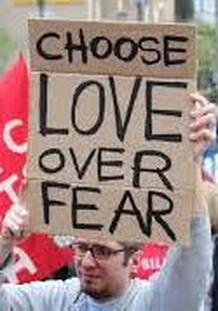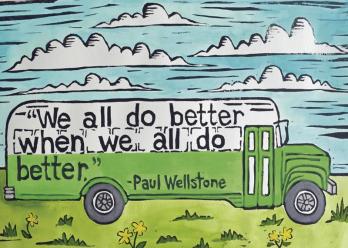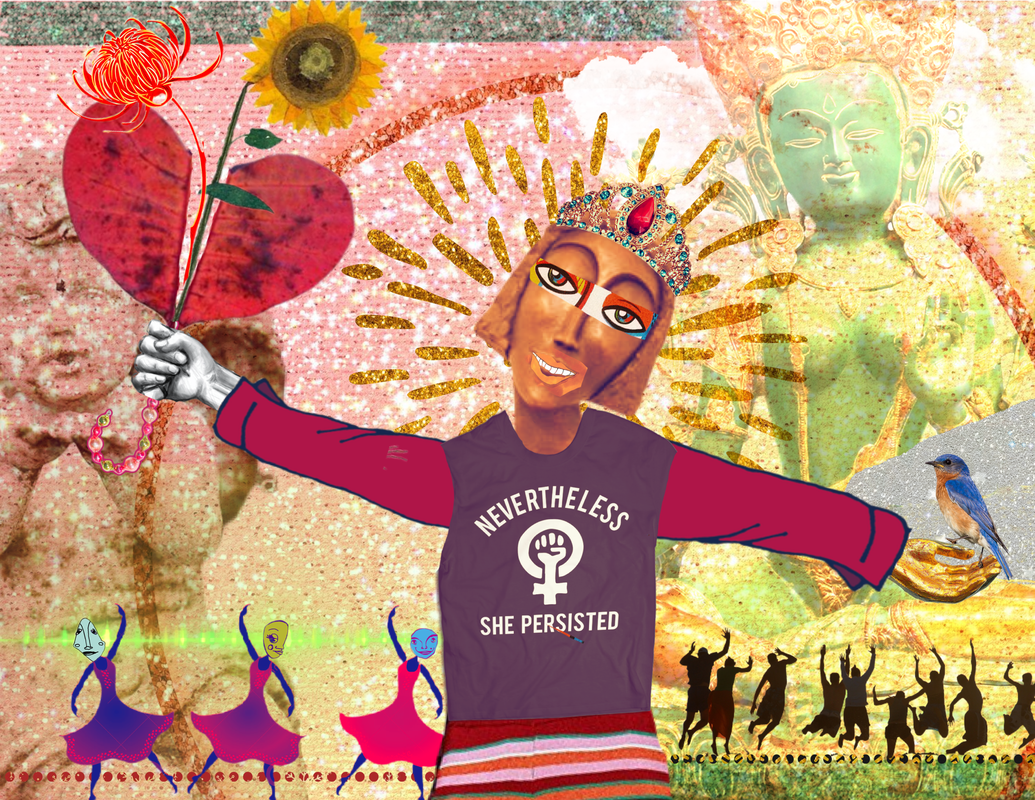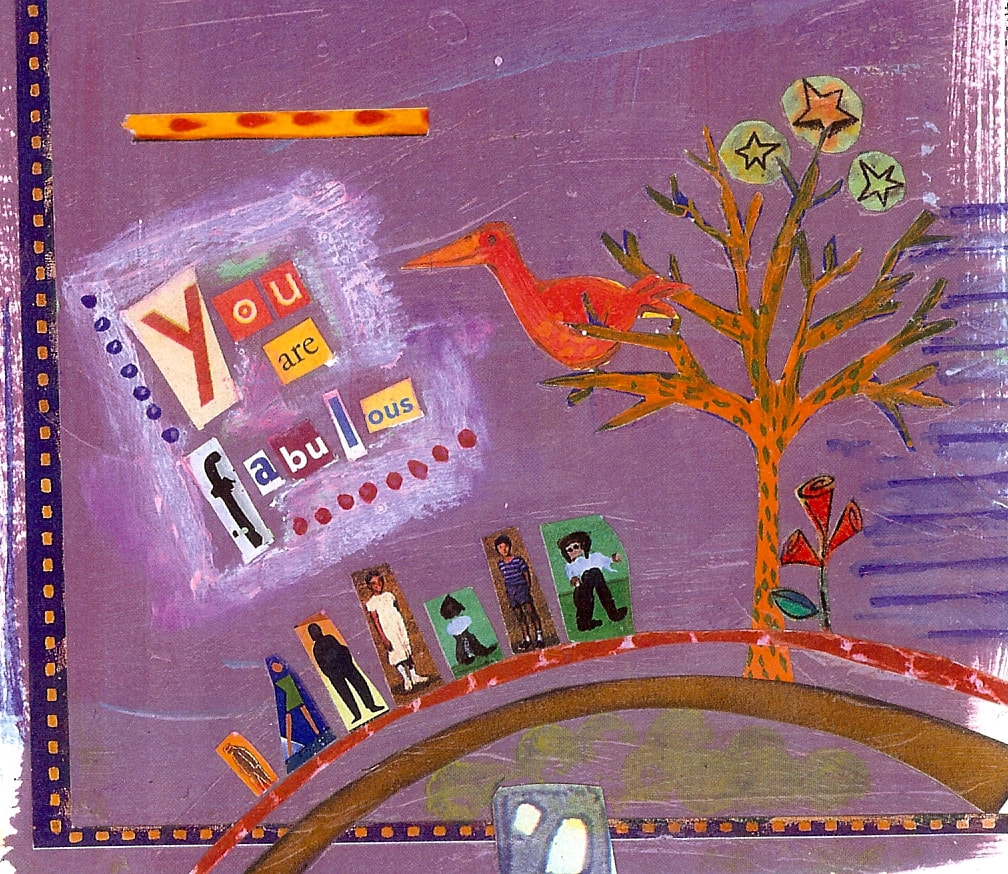This page explores our cultural assumption that I or we (or the ones in formal and informal power) have a right to comfort, which means we cannot tolerate conflict, particularly open conflict. This assumption supports the tendency to blame the person or group causing discomfort or conflict rather than addressing the issues being named.
The invitation on this and every page is to investigate how these characteristics and qualities lead to disconnection (from each other, ourselves, and all living things) and how the antidotes can support us to reconnect. If you read these characteristics and qualities as blaming or shaming, perhaps they are particularly alive for you. If you find yourself becoming defensive as you read them, lean into the gift of defensiveness and ask yourself what you are defending. These pages and these characteristics are meant to help us see our culture so that we can transgress and transform and build culture that truly supports us individually and collectively. Breathe into that intention if you can.
The invitation on this and every page is to investigate how these characteristics and qualities lead to disconnection (from each other, ourselves, and all living things) and how the antidotes can support us to reconnect. If you read these characteristics and qualities as blaming or shaming, perhaps they are particularly alive for you. If you find yourself becoming defensive as you read them, lean into the gift of defensiveness and ask yourself what you are defending. These pages and these characteristics are meant to help us see our culture so that we can transgress and transform and build culture that truly supports us individually and collectively. Breathe into that intention if you can.
|
The right to comfort shows up as:
|
|
Antidotes or suggestions for how to show up in more connecting and healing ways:
|
|
Fear of (open) conflict shows up as:
|
|
Antidotes or suggestions for how to show up in more connecting and healing ways:
|
|
Power hoarding shows up as:
|
|
Antidotes to power hoarding include:
|
|
Allan, a white man in his late thirties approached the microphone, sitting squarely on a lectern placed to face the city council members perched in their chairs high on a stage, protected behind their long curved wooden desk. Allan had come to argue against the controversial development project that the council was about to approve. He lifted a sheaf of papers above his head. Shaking them with a dramatized rage, he announced how his extensive research had unearthed a conflict of interest – a number of council members, including the Mayor, had accepted donations from the developer in question. He demanded, in a loud and commanding voice, that all those receiving money recuse themselves from the vote. As he finished and returned to his seat, the room held its breath, the air heavy with his heated accusations.
And then, with a rushed release, the Mayor spoke. In a voice angry and terse, he barked "how dare you impugn our motives? These accusations are the height of disrespect, unspeakably rude." He finished his rebuke and council person after council person took their turn to add to the chorus of reproach, even those who Allan had not named. I sat there, watching this display of electoral outrage, struck by the defensiveness, both real and performed. Power doesn’t want to be confronted publicly (or privately for that matter). Those in power (the power elite) have always demonized truth telling and trouble making unless they are the ones doing it. People holding power, whether elected or appointed or hired to their authority, tend to be afraid of any confrontation that challenges their power or their right to power. They try to ignore it or run from it, or when those strategies fail, they blame whoever is raising the challenge rather than address the challenge itself. They insist on politeness as terms for conversation or negotiation, requiring people to “check” their anger, particularly when that anger is a logical response to whatever they are doing. They accuse us of being rude particularly when their decisions are deeply rude to us. Their accusations – you are impolite, you are out of line – become the issue rather than, as in this case, the sketchy development deal. I attended this city council meeting years ago in a small southern city with a liberal, sometimes even progressive, bent. As I watched the display of defensiveness across lines of race, I couldn’t fail to note how each council person in turn focused on accusing the man of rudeness; not one responded to what he actually said. No one denied taking money; all insisted that the problem was in the public naming of their behavior. This is just one example of both a fear of open conflict and a claim to comfort. |
Astronaut Scott Kelly, 2018
talking about the view of Earth from space Artist: Amy Rice.
|
Right to comfort, power hoarding, and fear of open conflict are closely aligned with another characteristic - the illusion of control. Here again, western Christianity weighs in with the idea that the role of humans is dominion rather than interdependence.
Paul Kivel writes in Living in the Shadow of the Cross (p. 57-59): Christianity's basic message about the material world is that only humans have souls, and we were given dominion over the Earth and everything on it. In the third century BCE, dominus meant slave master. Later, dominum came to mean absolute ownership. ... When humans are considered superior to animals and plants and the world only a way station for humans, destruction of the Earth is inconsequential. ... Even when the word dominion is interpreted as stewardship, the basic concept can continue to hold humans separate from the Earth and in charge of it. A note: Beginning in the early 15th century, the Roman Catholic Church began issuing a series of papal bulls or public decrees giving first Portugal and then England the right to conquer "pagans" and enslave them as a driving force of colonization. The justification was that anyone not a Christian was not human. The Christian states of Europe and later the Christian power elite in the Americas justified the theft of indigenous peoples’ land, territories and resources, as well as the enslavement of people from Africa, as a right of control and conquest over those considered not human. As late as 1947, the Tee-Hit-Ton Indians in Alaska lost a lawsuit against the US government when the US Forest Service assumed the right to their land; the court cited international law assigning the lands of "heathens and infidels" to "Christian nations." Fifty years later, even the esteemed Supreme Court Justice Ruth Bader Ginsberg cited this doctrine of discovery as a government right to hold onto seized land in a case brought by the Oneida Indian Nation of New York. This history shows the exertion of control (not just the illusion) and suggests the endurance of policies and laws that depend on an ideology committed to the sorting of who is really human and who is not. This disrespect for relationships - human to human, human to earth and plants and wind and sun - is the basis of our current environmental crisis. So many in power continue to act from an illusion of control over other humans and the earth that is both unsustainable and destructive - to all living beings. As a result of this cultural justification of control, we internalize, many of us, this belief that we can or should control things that we cannot possibly - how others behave and even how we feel or behave. Our urgency to control, to fix, save, set straight (thank you Barry Pearman) means we have little to no ability to allow, to be with, to accompany. We lionize mastery and discipline over others and ourselves and when we fail to master or our discipline falters, we blame each other or ourselves. And in this way we reproduce cycles of fear and shame and guilt or cycles of projection of fear and shame and guilt when what we really long for, many if not most of us, is a sense of belonging to and with each other and the earth. As astronaut Scott Kelly notes, we're all in this together. As the late Senator Paul Wellstone noted, we all do better when we all do better. |
if....
|
if I could buy
anything at all I would buy blue and I would buy underwear I would most certainly not buy old love or the geography of interrupted longing dulled by too much time I would buy stars and I would stretch them in and among the dense fog in my head I would pierce things, puncture the dull and the boring |
I would carry afraid
into the bed and I would, if I could, dream it airless and absentminded I would carve shapes, maybe five, one for each finger and I would chase an hour or two to spoon what is needed into your dish I would roam the aisles, pack my bag translucent, transparent even, look for you, reach for you even if I couldn’t find you I would stitch you together out of used things, out of anything at all if ever I would if ever I could buy what matters |
|
This story takes place very early in my journey, when I was working with James W., my colleague at the time. James and I had been working together for about 3 years at that point. An African-American Pentecostal minister who had joined the staff to lead one of our new projects, our partnership was bonded in long drives that gave us uninterrupted time to talk about everything and anything. Often what we talked about had to do with race and religion and gender. James was both exceedingly open-hearted and deeply grounded in his religious beliefs; our conversations were rich and candid and laced with lots of laughter and not a few heated arguments. These long car rides became the basis of an extended work partnership and a lifelong friendship.
The two of us had been hired to facilitate a coalition of city agencies and non-profits brought together to apply for a large grant. The goal was to collectively address the ever more complex consequences of rising drug use, addiction, and profiteering in our community. The coalition was, like many, unwieldy and fragile. The people at the literal table represented well-funded large and long-standing organizations used to calling the shots along with small, struggling neighborhood organizations housed in poor communities where the drug trade was most visibly damaging. The funder, and therefore the coalition, was not concerned with drug users and dealers with money who knew how to hide their habits in the performed safety of their manicured and gated communities. The funder, and therefore the coalition, was focused on “helping” stem drug use that both exemplified and defined the "plight" of those labeled ever deficient and needy. Ethel K. was a leader of one of these neighborhood organizations. A formally educated African-American woman, impeccable in her neat, professional dress, and clipped concise communication, Ms. K. was becoming an institution in the town as a fierce and vocal advocate on behalf of those living in the public low-income housing community where she worked. On this particular afternoon, the group of about 20 people was organized around a large conference table in one of the city’s large meeting rooms. Sun streamed through the large windows as people sat, uncomfortable and tense in attempts to negotiate power and ownership of what promised to be a large sum of money. As in many of these stories, I don’t remember the actual catalyst; what I do know is that I said something or suggested something and whatever it was did not sit well with Ms. K. She rose up out of her chair, tall and imposing, to give me a very public and thorough talking to, admonishing me for whatever assumptions I was making that, I would guess, erased her community. I do remember feeling absolutely humiliated, the heat rushing up into my cheeks, hurt and defensiveness claiming my chest. I somehow made it through the rest of the meeting. I don’t remember if James and I ever talked about it, although we must have. What I do remember is that I went home and wailed, both because I had been publicly yelled at and mostly because this public thrashing was showing me up as less than the perfect white person I was trying so hard to be. After I cried myself out, I poured myself an inch of bourbon neat in a small clear glass, and sat quietly on the bed, legs pulled up under me, wrapped in a blanket meant to simulate some level of comfort. I was emotionally and physically exhausted, worn through by a sense of defeat. The fatigue and the bourbon, though, loosened my brain a bit and in that opening, a new thought arrived, one that would change everything. I realized that Ms. K. could easily have said nothing. I realized that she had taken a great risk in speaking out and how that risk was actually an offering of love. She could have chosen to stay silent, as I know too often happens, sitting on her dis-ease and frustration, writing me off as just another white woman too clueless to understand what was actually needed. By extending a challenge, she was letting me know that she expected more from me, perhaps even saw me as someone who might have the capacity to respond beyond defensiveness. Or perhaps she had just reached the end of her rope. This was the moment I started to develop a different relationship with my right to comfort, which up until that point had been an unspoken and assumed legacy of my upper middle-class world. This was the moment I started to appreciate that I could receive anger as a gift, even if I didn’t understand it or didn’t agree with it. I’m not talking about anger that turns into violence, I’m talking about the everyday angers that racism and white supremacy both create and forbid. The next day I reached out to Ms. K. to thank her for speaking up, for letting me know how to think about the situation differently. That conversation led to lunch dates and then we began spending time at each other’s homes. Then a trip to the beach with a few other women. Within a couple of years, we had become friends. |
another
|
|

Several of the racial equity principles apply as antidotes to fear of conflict and right to comfort. You might want to review them all to see which might prove most helpful.
We live in a culture of fear. Fear shuts down our ability to be creative, compassionate, and brave; fear also divides us and pits us against each other. Notice when fear shows up, name it, and seek ways to feel it, address it, and choose a way that builds connection and relationship. If you know you are not in a place to do that, then be clear and honest about your limits. Ground your actions in a desire for connection, even if only or first with yourself. Choose love (not that it’s always easy to know what love is in any situation) and ask yourself: what would build connection here? What would build relationship? What would build love? |
|
Taking action for racial justice requires a level of self-awareness that allows us to be clear about what we are called to do, what we know how to do, and where we need to develop. Another way of thinking about this is we need to know our strengths, our weaknesses, our opportunities for growth, and our challenges. Knowing ourselves means that we can show up to the work knowing where we are skilled and confident, where we need to learn and are sitting with a lot of not knowing, and where we need to ask for help or admit when we don’t know what we’re doing. Knowing ourselves means knowing what we are feeling and taking responsibility for those feelings rather than assuming it is the job of the group to take care of us on our terms.
White supremacy and racism affect all of us; we internalize cultural messages about our worth or lack of worth and often act on those without realizing it. We also tend to reproduce dominant culture habits of leadership and power hoarding, individualism, one right way. We may be dealing with severe trauma related to oppression. We may be addicted to a culture of critique, where all we know to do is point out what is not working or how others need to change. Doing our personal work so that we can show up for racial justice is, ironically, a collective practice. We need to support each other as we work to build on our amazing strengths – our power, our commitment, our kindness, our empathy, our bravery, our keen intelligence, our sense of humor, our ability to connect the dots, our creativity, our critical thinking, our ability to take risks and make mistakes. We also need to support each other as we work to address the effects of trauma and the dis-ease associated with white supremacy and racism. We do this by calling each other in rather than out. We do this by recognizing that we are both very different as a result of our different lived experiences and we are also interdependent as a growing community seeking and working for justice. Knowing ourselves means taking responsibility for ourselves and how we show up to facilitate movement building. |
|
The book’s cover is colorful; spindly legs atop small feet stick out from the pages at the bottom and hands wave from pencil-thin arms that jut out a bit stiffly from the sides. The book dances cheerfully if awkwardly, suspended in air over my right shoulder. Turning my head to take a closer look, I see that the book is a bit frayed and worn, showing its age which is exactly and not coincidentally the same as mine.
I open the book, or perhaps it opens for me. A ring-shaped hole has been carved into the thickness of the pages and inside the perfect circle sits a loop, glowing as it whirls frenetically round and round, stuck in its perpetual flow. The loop silently calls to me, with the seduction of its mesmerizing motion. I have been invited here too often of late, and I do not want to return. Getting caught is punishing, a descent into a level of fear and loathing grows with each rotation. So I resist and instead simply watch, as the dancing book, pages wide open, continues to try to lure me in. The question comes: perhaps I should consider what the book wants. I examine the book again, watching it, still wary and yet now curious. Under my gaze, the book slows and then comes to a stop. The book, apparently, is also looking at me. “What do you want?” I ask. And the book, in reply, opens its pages even wider, and then, with a gentle flutter, begins to softly soar. “I want to fly,” it says, “I just want to fly.” Higher and higher it goes, gliding in gradually growing loops like the one in its own belly. The book, unbeknownst to me, wants not just to fly but to soar aimlessly, free of the constraints of looped circles. And so, as I watch, it drops the loop from its belly, and, as the loop falls, it opens, gradually uncurling itself, landing on the earth below in a slightly crooked line, a path. Like the loop it once was, the path also beckons, and this time, intrigued, I accept the invitation and stepping onto it, turn left towards the horizon. The path winds gently over an open landscape. Looking up, I see a skyscape of yellow tinged with swipes of orange, the sun welcoming me forward. I climb up a low hill to its top and look down into a valley. The glen is filled with people – laughing, dancing – a joyful energy floats up to where I am standing. I feel a vibrancy enter my body and tingling, I sit with my arms wrapped around my knees. They are ready to welcome me and I want to pause a minute, take the welcome in, and allow myself a short rest, knowing that any minute, I can wander down and enter belonging. |
|
|
White Supremacy Culture | Offered by Tema Okun
first published 2021 | last update 8.2023 |


